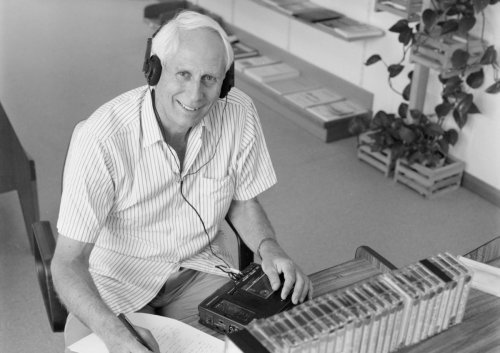The following guide is to assist you with requesting, accessing and publishing collection items in the Oral History and Folklore Collection.

Finding Oral History and Folklore items
You can search for Oral History and Folklore recordings through:
- The Catalogue - Limit your search to Oral History and Folklore collection by selecting the ‘Audio’ option in the Catalogue. Some interviews may be freely available online. Look for the blue ‘Listen Online’ icon on the catalogue record.
- Trove - Select the ‘Music, Audio & Video’ portal and then refine your search results to ‘Interview, Lecture, Talk’. You can also search within transcripts or summaries that are available online through Trove.
Oral History material is usually catalogued by the interviewee’s name. Interviews may also be part of a project or collection and it will appear in the title, such as the Bringing them Home project and Forgotten Australians and Former Child Migrants project.
If the interview is part of a project or collection you can view the collection record by clicking on the 'see collection record (go up)' link on the catalogue record. You can also see related records in the collection by clicking on the ‘See records in related collection’ link.
Accessing the collection
Access to Oral History and Folklore interviews is stipulated by a range of access conditions usually set by the interviewee. The most common access conditions are:
- access open for research, personal copies and public use
- access open for research and personal copies; written permission required for public use
- access open for research, written permission required for personal copies and public use
- written permission required for research use, personal copies and public use.
Most Oral History and Folklore material can be accessed for research. However if the access conditions state that permission is required, you will need written permission from the interviewee before you can put in your request. Please contact us to assist you with arranging permission.
Request material to access by logging into the catalogue and submitting an online request. Check the collection delivery times for information on when collection material is delivered to the Special Collections Reading Room.
Tip: The recording, summary and transcript are listed as separate holdings in the catalogue, make sure that you have selected the correct holding before putting in your request.
When ready, material will be available to access in the Special Collections Reading Room. Interviews are generally supplied on:
- MP3 or Audio CD
- Hardcopy Transcript or Summary
- PDF Transcript or Summary on CD.
Special Collections Reading Room staff will allocate you to one of the desks in the reading room, depending on your requirements and material you have requested. Staff can also provide you with a pair of headphones if you have requested any audio items.
Special Collections staff will let you know if you are unable to access an interview due to restrictions on access or if it requires digitisation.
Copying Oral History material
Check the access conditions on the item’s catalogue record to determine if copying is allowed or if you need permission from the interviewee.
You can request copies of Oral History and Folklore material through our copying service, Copies Direct.
- Select the 'Order a copy' tab at the bottom of the catalogue record for the item you want and click on 'Add to cart' to open the online order form.
- We will advise you if we need to seek the interviewee’s permission before we can supply you with a copy.
- We will also advise you if there are any other responsibilities when the copy is supplied.
Tip: Check rights and the Oral History and Folklore collection and Copies Direct for more information.
If you are accessing transcripts or summaries in the Special Collections Reading Room you can also make copies of them, if the access conditions allow for copying. This can be done either on the photocopiers in the Special Collections Reading Room or using your camera.
Publishing Oral History items from our collection
You will need to formally notify us if you intend to publish any material from the Oral History and Folklore collection. Depending on the access conditions, you may also need the interviewee’s permission to use their interview publically.
Normal copyright law applies to some published items in the Oral History and Folklore collection such as early radio broadcasts and commercial cassette recordings. Special Collections staff can advise you if the recording you are using is published material.
More information on rights and the Oral History and Folklore collection.
Citing
How do I acknowledge the Library in my publication?
Contact Us
Use the Ask a Librarian service to lodge an online enquiry with us.
Phone: (+61) 2 6262 1266